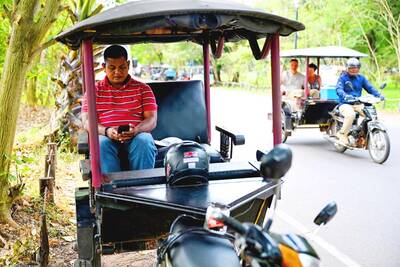Prime Minister Goh Kun, South Korea's acting president during a presidential impeachment trial, vowed yesterday to crack down on illegal campaigning and protests in the run up to this month's parliamentary election.
The campaign period for the April 15 National Assembly election begins today amid court deliberations over last month's impeachment of President Roh Moo-hyun and following weeks of big street protests over the issue.
"I have no party affiliation and will manage the election fairly and end the unfair and illegal cycle in our history with this vote," Goh said in a statement. Past parliamentary votes have been marred by vote buying.
"The government will take stern action against illegal activities and any violations," said the veteran bureaucrat, who took over as interim president when Roh's powers were suspended after his impeachment on March 12.
Political analysts said a single-issue race would mark a setback in South Korea's vibrant but still young democracy.
"The current situation with the impeachment of President Roh dominating all other issues is not sound," said Hong Kyu-dok, politics professor at Sookmyung Women's University in Seoul. "There are many other important agenda items such as non-performing loans or unemployment, but there has not been enough discussion about these problems," he said.
The anger over Roh's impeachment that has drawn thousands of people to peaceful protests looks set to boost voter turnout to 70 percent, 10 percent higher than in 2000, absentee ballot registration data show, said a senior government official.
Goh, nicknamed "Mr Stability," thanked the people for maintaining calm during the impeachment saga. But he vowed to uphold a ban on street protests over Roh's impeachment, effective from April 2, which is also the first day of campaigning.
He threatened "stern measures" if public officials are found supporting a party or candidate in violation of laws prohibiting partisan speech by civil servants. It was those rules which Roh was found to have broken and which sparked his impeachment.
Roh was impeached by the opposition-controlled assembly for remarks he made in support of the pro-government Uri Party.
But popular outrage against the impeachment has seen the Uri Party's support ratings surge, while backing for Roh's foes, the Grand National Party (GNP) and the Millennium Democratic Party (MDP), has tumbled in public opinion polls.
In the most comprehensive media poll, a JoongAng Ilbo newspaper survey of 74,200 voters gave the populist, center-left Uri Party a solid lead in both electoral districts and in the proportional representation vote.
Voters on April 15 will cast two votes, one for individual candidates in 243 first-past-the-post constituencies and one for the 56 seats decided by a proportional representation vote on party lines.

The death of a former head of China’s one-child policy has been met not by tributes, but by castigation of the abandoned policy on social media this week. State media praised Peng Peiyun (彭珮雲), former head of China’s National Family Planning Commission from 1988 to 1998, as “an outstanding leader” in her work related to women and children. The reaction on Chinese social media to Peng’s death in Beijing on Sunday, just shy of her 96th birthday, was less positive. “Those children who were lost, naked, are waiting for you over there” in the afterlife, one person posted on China’s Sina Weibo platform. China’s

‘NO COUNTRY BUMPKIN’: The judge rejected arguments that former prime minister Najib Razak was an unwitting victim, saying Najib took steps to protect his position Imprisoned former Malaysian prime minister Najib Razak was yesterday convicted, following a corruption trial tied to multibillion-dollar looting of the 1Malaysia Development Berhad (1MDB) state investment fund. The nation’s high court found Najib, 72, guilty on four counts of abuse of power and 21 charges of money laundering related to more than US$700 million channeled into his personal bank accounts from the 1MDB fund. Najib denied any wrongdoing, and maintained the funds were a political donation from Saudi Arabia and that he had been misled by rogue financiers led by businessman Low Taek Jho. Low, thought to be the scandal’s mastermind, remains

Australian Prime Minister Anthony Albanese yesterday announced plans for a national bravery award to recognize civilians and first responders who confronted “the worst of evil” during an anti-Semitic terror attack that left 15 dead and has cast a heavy shadow over the nation’s holiday season. Albanese said he plans to establish a special honors system for those who placed themselves in harm’s way to help during the attack on a beachside Hanukkah celebration, like Ahmed al-Ahmed, a Syrian-Australian Muslim who disarmed one of the assailants before being wounded himself. Sajid Akram, who was killed by police during the Dec. 14 attack, and

VISHNU VANDALS: A Cambodian official accused Thailand of destroying a statue in a disputed border area, with video showing the Hindu structure being torn down The Thai military said ceasefire talks with Cambodia, set to begin yesterday, are expected to conclude with a meeting of the countries’ defense ministers on Saturday, as the two sides seek to end weeks of deadly clashes. The talks started at 4pm in Thailand’s Chanthaburi Province, which borders Cambodia. The Thai Ministry of Defense outlined several demands to be discussed ahead of the bilateral meeting of the General Border Committee (GBC) on Saturday. If secretariat-level discussions fail to reach agreement on key technical frameworks such as troop deployments, the Thai side would not proceed with the GBC meeting or sign any agreement on